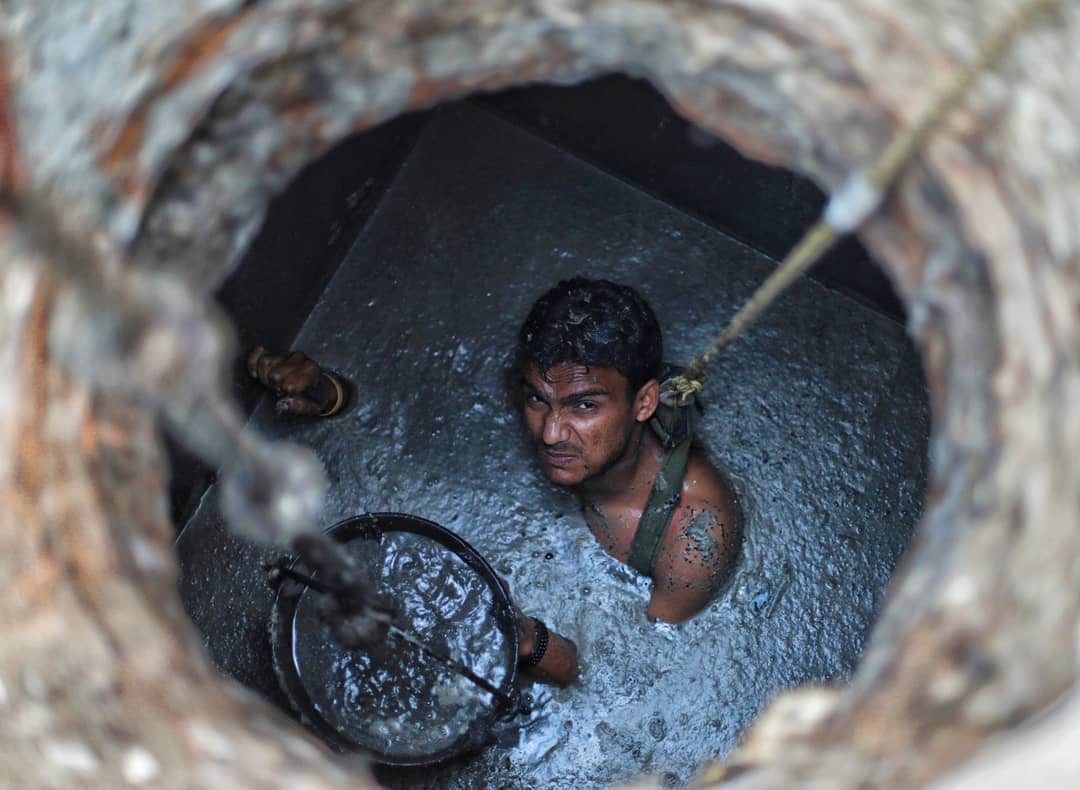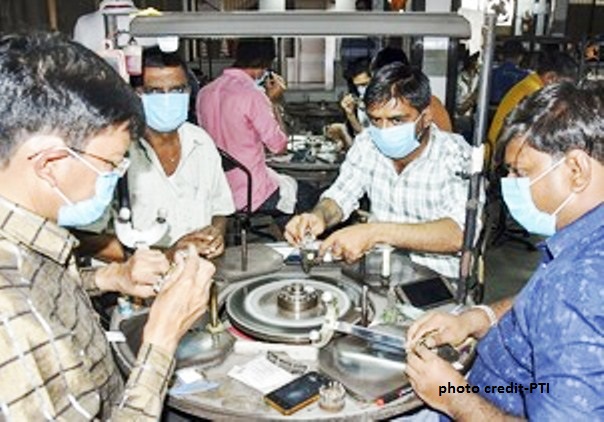INDIA’S SEWERS, BANDICOOT 2.0 AND MANUAL SCAVENGING

What would we do if on any given day the drainage system in our homes takes a hit and dirty, stinking water floods our bathrooms and kitchens? In most cases, a scavenger is called to clean up the mess, followed by a plumber to fix the pipes.
|| Sajeeda Feroz
What crime did the scavenger commit that he/she has to clean up our waste? Was it the crime of living a poverty-stricken life or the crime of not having gone to school?
Now imagine this on a much larger scale, to be more accurate, “the drainage system of the entire nation”. When getting clogged, a scavenger needs to go inside a manhole in a street, risking his life among the foul smell and poisonous gases to get it functioning again and he does this with his bare hands and a metal bucket. It’s a heart-wrenching sight.
Manual scavenging is defined as “the removal of human excrement from public streets and dry latrines, cleaning septic tanks, gutters and sewers using the most basic of tools such as buckets, brooms, and baskets”.
Indian society’s deeply unequal social structure based on caste hierarchy and patriarchy forms the primitive reason. Moreover, the moral responsibility equally lies with the rich, middle and other influential classes who have been so immersed in their own lives that they do not care about the issue or question the authority, yet practice it themselves.
A large number of manual scavengers die while cleaning sewers due to the inhalation of toxic gases and lethal fumes inside sewers, thus leading to asphyxiation. Often, there is no effective provision for injury or death as most of these workers are employed on a contract basis. Even when their lives are at stake, they are forced to continue working. Data reveals that 80 percent of manual scavengers don’t survive till the age of 60, and at least three sanitation workers die every five days in the country. They are also riddled with various health problems like respiratory illnesses, and skin diseases, besides being socially disadvantaged in society.
Sanitation workers across the nation are working on the frontlines during the pandemic and are highly exposed to all kinds of domestic, fatal and hazardous waste. Not every one of them receives the ‘luxury’ of wearing protective gear and their working conditions are a serious cause of alarm.

This inhuman practice still continues despite laws such as The Employment of Manual Scavenging and Construction of Dry Latrines (Prohibition) Act, 1993; the Prohibition of Employment as Manual Scavengers and their Rehabilitation Act, 2013 (MS Act, 2013) and a Supreme Court direction in 2014 to all the States to abolish manual scavenging and take steps for the rehabilitation of such workers. In a 2019 Supreme Court hearing on manual scavenging, the Court said: “No country sends its people to gas chambers to die.”
According to Safai Karmachari Andolan, a movement aimed at eliminating manual scavenging, “It is largely prevalent across the country and over 98 percent of the people employed in manual scavenging jobs comprise either women or people from Dalit communities”. Nearly 370 deaths have been recorded as a result of manually cleaning sewers in the five years leading up to 2019. The Socio-Economic Caste Census of 2011 recorded over 1.82 lakh families that had at least one member employed as a manual scavenger. There have been discrepancies in formal enumeration, but some studies suggest that numbers could be as high as 50 lakh sanitation workers.
In today’s tech-savvy world, why are we still sticking to the age-old practice of sending people inside manholes? Why can’t we make use of modern technology to clean them? Well, the good news is, it’s happening and this is welcome news to our ears and could mean an end to manual scavenging woes in the future. This has helped sanitation workers especially during the pandemic, where reports have found a 70 % increase in waste owing to the usage of masks, gloves, used paper roles and other bio – hazardous waste in an attempt to contain the spread of the Covid – 19 Virus.
This hazardous waste has posed dangerous threats to the lives of manual scavengers in more ways than one. Therefore, the implementation of such modern technology will bring relief to people on the verge of getting affected by noxious waste. During these troubled times, sanitation workers don’t have to climb into the sewers, they can wear a mask and protective gear, while easily getting the work done from a distance.
Founded in 2015, a Kerala-based start-up company, Genrobotics Innovations Private Limited has invented a machine called Bandicoot 2.0 to clean up the sewers. The company’s founders Rashid Bin Abdulla Khan, Vimal Govind MK, Arun George and Nikhil NP developed the first version of the robot in 2017. The company is providing the upgraded and second version to local bodies across the country and abroad. Genrobotics also won the national award for the “best campus initiated startup” from ‘Startup India’ for its invention in 2019. The company is determined to fight the evil of manual scavenging and stop deaths associated with it, while also helping manual scavengers lead dignified lives.
According to Genrobotics, “the 50-kg device mimics all the man activities such as, lifting the heavy manhole cover, scooping the solid waste from the bottom of the sewer with its robotic spider-like limbs and emptying it into a bucket attached to it, thus allowing for zero human-intervention in cleaning. The robot removes clogs and positions itself with a jet pressurized with water to clean the pipes and can clean and unclog both manholes and septic tanks having multiple openings.
The arms can enter deep into the manholes irrespective of their width and depth. Bandicoot 2.0 also uses infrared and waterproof night vision cameras, advanced technology, sensors and other control panels to project the inside of the manhole on the monitor fixed on the external stand. The interface is easy, user-friendly and can clean up to 10 manholes a day. A team from Genrobotics, trains sanitation workers to operate the robot thus helping them retain their jobs with dignity and proceed working with safety. Each robot costs up to ₹32 lakh factoring in overhead expenses, training and maintenance. Requiring minimal maintenance, it comes with a one-year warranty.
Having implemented the technology in more than 10 States and around 20 municipal corporations since the launch of the latest version of Bandicoot 2.0 in 2018, Genrobotics has collaborated with States like Maharashtra, Gujarat, Tamil Nadu, Punjab, Haryana, and Uttar Pradesh for the greater good of the people and helping them lead safe lives.
Three people: two sewage cleaners and an auto-driver who had tried to help them, had died of asphyxiation in a manhole in Kozhikode. This tragedy fuelled the reason for the friends to do something about manual scavenging and save lives. They have made it their mission to make each city, town and district in the country manual-scavenging free.“We will not rest until we have deployed ‘Bandicoot’ across the country, making it free from this inhuman practice,” said Rashid, one of the founders at an interview.
The project initially encountered a common problem faced by start-ups, which is the lack of funding. The group of friends after completing their degree had no alternative but to take up jobs in the corporate sector. The Kerala IT Secretary then helped the team establish themselves and the Kerala Start- up Mission followed by the Kerala Finance Corporation contributed. The Kerala Water Authority was the first public body that collaborated with Genrobotics to successfully deploy Bandicoot in Thiruvananthapuram and from that point on, there was no turning back.
Keeping the government involvement aside, what can we as the “Common people” do,in order to help restrict this problem?
Cleanliness begins at home. One step at a time, can go a long way towards curbing this inhumanity. Do your research to get the sewers in your area cleaned without actually sending people in. Get the corporation to send in suction machines instead. Raise awareness on this issue. Talk to your family, friends, colleagues and make full use of your social media to raise your voice. Let’s make it a point to not call scavengers to clean up our homes.We can do it ourselves because it’s our home and cleaning our drainage does not strip us off our dignity. Proper maintenance of the drainage system in your house could go a long way in increasing the lifetime of pipes.
Make sure to refer manual scavengers to alternate jobs or grant them jobs which don’t take a toll on their health. We could also help their children apply for scholarships to have a good schooling. Remember: all major changes can’t happen in a single day. It takes time, patience and commitment from every one of us. Let’s work towards saving their lives and make it worth living by making sure that laws are strictly followed because it’s our responsibility. Take a pledge to stop this monstrous practice. Be responsible citizens and look out for the wellness and welfare of fellow beings.
“A scavenger who works in His service shares equal distinction with a king who uses his gifts in His name and is a mere trustee.” – Mahatma Gandhi



